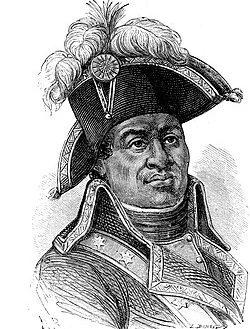TOUSSAINT LOUVERTURE
Toussaint Louverture (1743 – 1803) was a formerly enslaved man who rose to become the leader of the Haitian Revolution — the only successful large-scale slave revolt in history that led to the creation of an independent nation.
Here are the key points about him:
- Early Life: Born enslaved in the French colony of Saint-Domingue (modern-day Haiti), he gained his freedom in his 30s and became a respected plantation overseer.
- Military Leadership: When the Haitian Revolution began in 1791, he quickly emerged as a brilliant military strategist and commander. He fought first against, then alongside, the French, depending on the shifting politics of slavery and colonial power.
- Abolition of Slavery: He aligned with the French Republic after it abolished slavery in 1794, defeating rival colonial powers like Spain and Britain.
- Governor of Saint-Domingue: By 1801, Louverture effectively governed the colony. He restored order, rebuilt the economy, and even issued a constitution making him governor-for-life, while still claiming loyalty to France.
- Downfall: Napoleon Bonaparte, seeking to restore slavery, sent troops to Saint-Domingue in 1802. Louverture was captured through deception and deported to France, where he died imprisoned in 1803.
- Legacy: His leadership set the stage for Haiti’s independence in 1804, led by Jean-Jacques Dessalines. Louverture is remembered as one of the greatest figures in the global fight against slavery and colonialism.
Timeline of Toussaint Louverture
- 1743 – Born as François-Dominique Toussaint on the Bréda plantation in Saint-Domingue (modern Haiti).
- 1770s – Gains freedom from slavery; becomes a respected plantation overseer, horseman, and healer.
- 1791 – Slave uprising begins in Saint-Domingue. Toussaint joins the revolt, quickly rising as a skilled military leader.
- 1793 – Aligns with the Spanish against France, fighting for the abolition of slavery.
- 1794 – France abolishes slavery → Toussaint switches sides to fight for the French Republic.
- 1795–1798 – Leads French forces to defeat Spain and Britain, securing the colony for France.
- 1797 – Becomes commander-in-chief of Saint-Domingue’s army.
-
1801 – Writes a constitution:
- Slavery permanently abolished.
- Toussaint named Governor for Life.
- 1802 – Napoleon Bonaparte sends a massive army to reassert control and restore slavery. Toussaint resists but is captured by deceit.
- June 1802 – Deported to France and imprisoned at Fort de Joux in the Jura mountains.
- April 7, 1803 – Dies in captivity from harsh conditions (likely pneumonia or starvation).
- January 1, 1804 – His successors, led by Jean-Jacques Dessalines, declare Haiti independent — the world’s first Black republic.
- Legacy:
Toussaint Louverture is remembered as a military genius, a freedom fighter, and the architect who paved the way for Haiti’s independence. His life proved that enslaved people could not only fight for freedom but also govern themselves.



